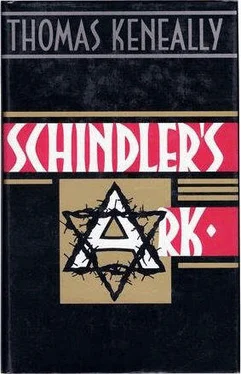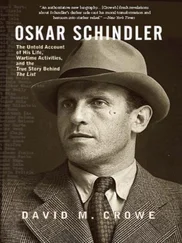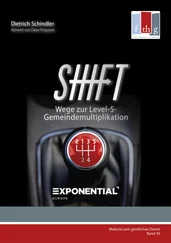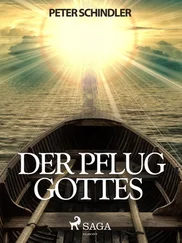“We’ll send you to the Gestapo doctor,” screamed Spira.
Biberstein, who had been aware of the shame in young Pfefferberg, had tutored him well. Poldek survived the Gestapo doctor’s inspection and was discharged from the OD as suffering from an ailment likely to inhibit his good performance in crowd control. Spira, saying goodbye to officer Pfefferberg, expressed a contemptuous enmity. The next day, Germany invaded Russia.
Oskar heard the news illicitly on the BBC and knew that the Madagascar Plan was finished now. It would be years before there were ships for a solution like that. Oskar sensed that the event changed the essence of SS planning, for everywhere now the economists, the engineers, the planners of movements of people, the policemen of every stripe put on the mental habits appropriate not only to a long war, but to a more systematic pursuit of a racially impeccable empire.
In an alley off Lipowa, its rear pointing toward the workshop of Schindler’s enamel plant, stood the German Box Factory. Oskar Schindler, always restless and hungry for company, used to stroll over there sometimes and chat with the Treuhänder, Ernst Kuhnpast, or to the former owner and unofficial manager, Szymon Jereth. Jereth’s Box Factory had become the German Box Factory two years back according to the usual arrangement—no fees being paid, no documents to which he was signatory having been drawn up.
The injustice of that did not particularly worry Jereth anymore. It had happened to most of the people he knew. What worried him was the ghetto. The fights in the kitchens, the pitiless communality of life there, the stench of bodies, the lice that jumped onto your suit from the greasy jacket of the man whose shoulder you brushed on the stairs. Mrs. Jereth, he told Oskar, was deeply depressed. She’d always been used to nice things; she’d come from a good family in Kleparz, north of Cracow. And when you think, he told Oskar, that with all the pineboard I could build myself a place there. He pointed to the wasteland behind his factory. Workers played football there, vast, hard-running games in plentiful space. Most of it belonged to Oskar’s factory, the rest to a Polish couple named Bielski. But Oskar did not point that out to poor Jereth, or say either that he too had been preoccupied by that vacant space. Oskar was more interested in the implied offer of lumber. You can “alienate” as much pineboard as that? You know, said Jereth, it’s only a matter of paperwork.
They stood together at Jereth’s office window, considering the wasteland. From the workshop came the sound of hammering and whining power saws. I would hate to lose contact with this place, Jereth told Oskar. I would hate just to vanish into some labor camp and have to wonder from a distance what the damn fools were doing here. You can understand that, surely, Herr Schindler?
A man like Jereth could not foresee any deliverance. The German armies seemed to be enjoying limitless success in Russia, and even the BBC was having trouble believing that they were advancing into a fatal salient. The Armament Inspectorate orders for field kitchenware kept turning up on Oskar’s desk, sent on with the compliments of General Julius Schindler scribbled at the bottom of the covering letters, accompanied by the telephoned best wishes of sundry junior officers. Oskar accepted the orders and the congratulations in their own right, but took a contradictory joy from the rash letters his father was writing to him to celebrate their reconciliation. It won’t last, said Schindler senior. The man [Hitler] isn’t meant to last. America will come down on him in the end. And the Russians? My God, did anyone ever take the trouble to point out to the dictator just how many godless barbarians there are over there? Oskar, smiling over the letters, was not troubled by the conflicting pleasures—the commercial exhilaration of the Armaments Inspectorate contracts and the more intimate delight of his father’s subversive letters. Oskar sent Hans a monthly bank draft of 1,000 RM. in honor of filial love and sedition, and for the joy of largesse.
It was a fast and, still, almost a painless year. Longer hours than Schindler had ever worked, parties at the Cracovia, drinking bouts at the jazz club, visits to the gorgeous Klonowska’s apartment. When the leaves began to fall, he wondered where the year had gone. The impression of vanished time was augmented by the late summer and now by autumn rains earlier than usual. The asymmetric seasons would, by favoring the Soviets, affect the lives of all Europeans. But to Herr Oskar Schindler in Lipowa Street, weather was still simply weather. Then, in the butt end of 1941, Oskar found himself under arrest. Someone—one of the Polish shipping clerks, one of the German technicians in the munitions section, you couldn’t tell—had denounced him, had gone to Pomorska Street and given information. Two plainclothes Gestapo men drove up Lipowa Street one morning and blocked the entrance with their Mercedes as if they intended to bring all commerce at Emalia to an end. Upstairs, facing Oskar, they produced warrants entitling them to take all his business records with them. But they did not seem to have any commercial training. “Exactly what books do you want?” Schindler asked them. “Cashbooks,” said one.
“Your main ledgers,” said the other.
It was a relaxed arrest; they chatted to Klonowska while Oskar himself went to get his cash journal and accounts ledger. Oskar was permitted time to scribble down a few names on a pad, supposedly the names of associates with whom Oskar had appointments which must now be cancelled. Klonowska understood, though, that they were a list of people to be approached for help in bailing him out.
The first name on the list was that of Oberführer Julian Scherner; the second, that of Martin Plathe of the Abwehr in Breslau. That would be a long-distance call. The third name belonged to the supervisor of the Ostfaser works, the drunken Army veteran Franz Bosch on whom Schindler had settled quantities of illegal kitchenware. Leaning over Klonowska’s shoulder, over her piled-up flaxen hair, he underlined Bosch’s name. A man of influence, Bosch knew and advised every high official who played the black market in Cracow. And Oskar knew that this arrest had to do with the black market, whose danger was that you could always find officials ready to be bribed, but you could never predict the jealousy of one of your employees.
The fourth name on the list was that of the German chairman of Ferrum AG of Sosnowiec, the company from which Herr Schindler bought his steel. These names were a comfort to him as the Gestapo Mercedes carried him to Pomorska Street, a kilometer or so west of the Centrum. They were a guarantee that he would not vanish into the system without a trace. He was not, therefore, as defenseless as the 1,000 ghetto dwellers who had been rounded up according to Symche Spira’s lists and marched beneath the frosty stars of Advent to the cattle cars at Prokocim Station. Oskar knew some heavy guns.
The SS complex in Cracow was an immense modern building, humorless, but not as portentous as the Montelupich prison. Yet even if you disbelieved the rumors of torture attached to the place, the building confused the arrestee as soon as he entered by its size, its Kafkaesque corridors, by the numb threat of the departmental names painted on the doors. Here you could find the SS Main Office, the headquarters of the Order Police, of Kripo, Sipo and Gestapo, of SS Economy and Administration, of Personnel, of Jewish Affairs, of Race and Resettlement, of the SS Court, of Operations, of SS Service, of the Reichskommissariat for the Strengthening of Germandom, of the Welfare Office for Ethnic Germans.
Somewhere in that hive a middle-aged Gestapo man, who seemed to have a more exact knowledge of accountancy than the arresting officers, began interviewing Oskar. The man’s manner was half-amused, like a customs official who finds that a passenger suspected of currency smuggling is really smuggling house plants for an aunt. He told Oskar that all the enterprises involved in war production were under scrutiny. Oskar did not believe it but said nothing. Herr Schindler could understand, the Gestapo man told him, that businesses supplying the war effort had a moral duty to devote all their product to that great enterprise—and to desist from undermining the economy of the Government General by irregular dealings.
Читать дальше












